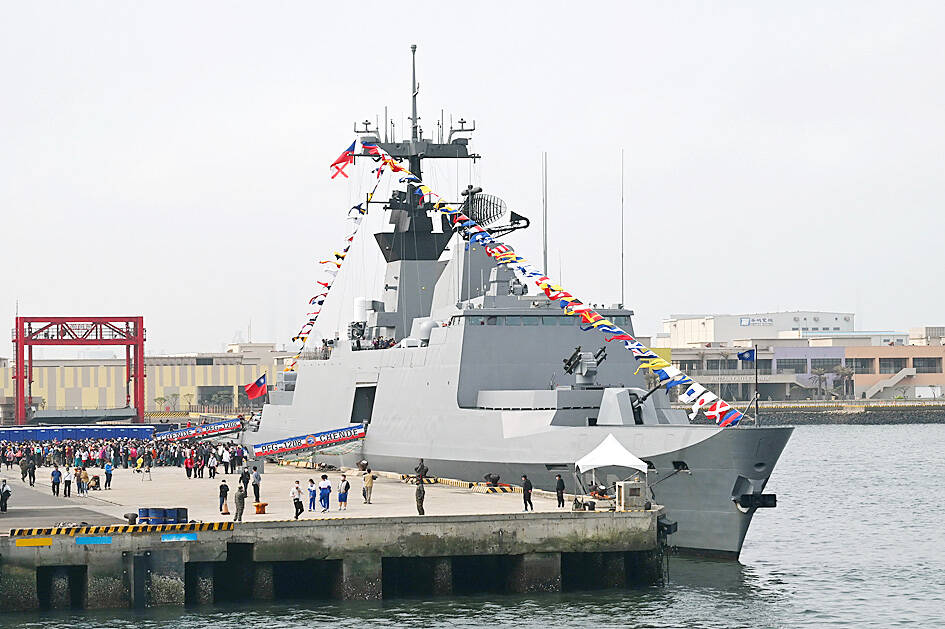The Ministry of National Defense has awarded a NT$2.49 billion (US$79.4 million) contract to DCI Group of France for ship combat system platform components, a government procurement notice dated yesterday showed.
The limited tender is being implemented in Kaohsiung from Jan. 18 to the same day next year, the notice said.
The contract would likely supply components to one of Taiwan’s six Kang Ding-class guided missile frigates, as DCI Group is the supplier of original equipment manufacturer parts for Laffeyette-class warships, on which they are based.

Photo: Liao Yao-tung, Taipei Times
The Kang Ding-class frigates — which comprise the navy’s 124th Fleet headquartered in Kaohsiung’s Zuoying Naval Base — are mainly employed in air defense, anti-submarine warfare, escort, anti-blockade and joint surface interception roles.
The navy has allocated a total of NT$43.2 billion to modernize the Kang Ding-class ships by 2030 with battle management system upgrades, new radars and vertical launch systems developed by the Chungshan Institute of Science and Technology’s Huayang Project.
The launch system would enable the frigates to fire indigenous Hai Chien II (“Sea Sword”) and Hai Kung III (“Sea Bow”) missiles instead of the aging Chaparral missile systems that originally equipped the class.
Taiwanese navy frigate the Chen De (承德), which was last seen being refitted at a dock in Kaohsiung last year, was the first Kang Ding-class warship to receive the upgrades. The listed completion time for the refitting is between next year and 2026.
The modernization program, with a budget of NT$5.76 billion for this year, is probably the source of funding for the latest contract with DCI Group, although the ministry did not specify whether the parts would be used for the Chen De or another ship.
The remainder of this year’s Kang Ding-class modernization budget is likely to be utilized for domestically developed systems and weapons.

Intelligence agents have recorded 510,000 instances of “controversial information” being spread online by the Chinese Communist Party (CCP) so far this year, the National Security Bureau (NSB) said in a report yesterday, as it warned of artificial intelligence (AI) being employed to generate destabilizing misinformation. The bureau submitted a written report to the Legislative Yuan in preparation for National Security Bureau Director-General Tsai Ming-yen’s (蔡明彥) appearance before the Foreign Affairs and National Defense Committee today. The CCP has been using cognitive warfare to divide Taiwanese society by commenting on controversial issues such as Taiwan Semiconductor Manufacturing Co’s (TSMC, 台積電) investments in the

INVESTIGATION: The case is the latest instance of a DPP figure being implicated in an espionage network accused of allegedly leaking information to Chinese intelligence Democratic Progressive Party (DPP) member Ho Jen-chieh (何仁傑) was detained and held incommunicado yesterday on suspicion of spying for China during his tenure as assistant to then-minister of foreign affairs Joseph Wu (吳釗燮). The Taipei District Prosecutors’ Office said Ho was implicated during its investigation into alleged spying activities by former Presidential Office consultant Wu Shang-yu (吳尚雨). Prosecutors said there is reason to believe Ho breached the National Security Act (國家安全法) by leaking classified Ministry of Foreign Affairs information to Chinese intelligence. Following interrogation, prosecutors petitioned the Taipei District Court to detain Ho, citing concerns over potential collusion or tampering of evidence. The

‘COMPREHENSIVE PLAN’: Lin Chia-lung said that the government was ready to talk about a variety of issues, including investment in and purchases from the US The National Stabilization Fund (NSF) yesterday announced that it would step in to staunch stock market losses for the ninth time in the nation’s history. An NSF board meeting, originally scheduled for Monday next week, was moved to yesterday after stocks plummeted in the wake of US President Donald Trump’s announcement of 32 percent tariffs on Taiwan on Wednesday last week. Board members voted to support the stock market with the NT$500 billion (US$15.15 billion) fund, with injections of funds to begin as soon as today. The NSF in 2000 injected NT$120 billion to stabilize stocks, the most ever. The lowest amount it

NEGOTIATIONS: Taiwan has good relations with Washington and the outlook for the negotiations looks promising, Minister of Economic Affairs J.W. Kuo said Taiwan’s GDP growth this year is expected to decrease by 0.43 to 1.61 percentage points due to the effects of US tariffs, National Development Council (NDC) Minister Paul Liu (劉鏡清) said at a meeting of the legislature’s Economics Committee in Taipei yesterday, citing a preliminary estimate by a private research institution. Taiwan’s economy would be significantly affected by the 32 percent “reciprocal” tariffs slapped by the US, which took effect yesterday, Liu said, adding that GDP growth could fall below 3 percent and potentially even dip below 2 percent to 1.53 percent this year. The council has commissioned another institution